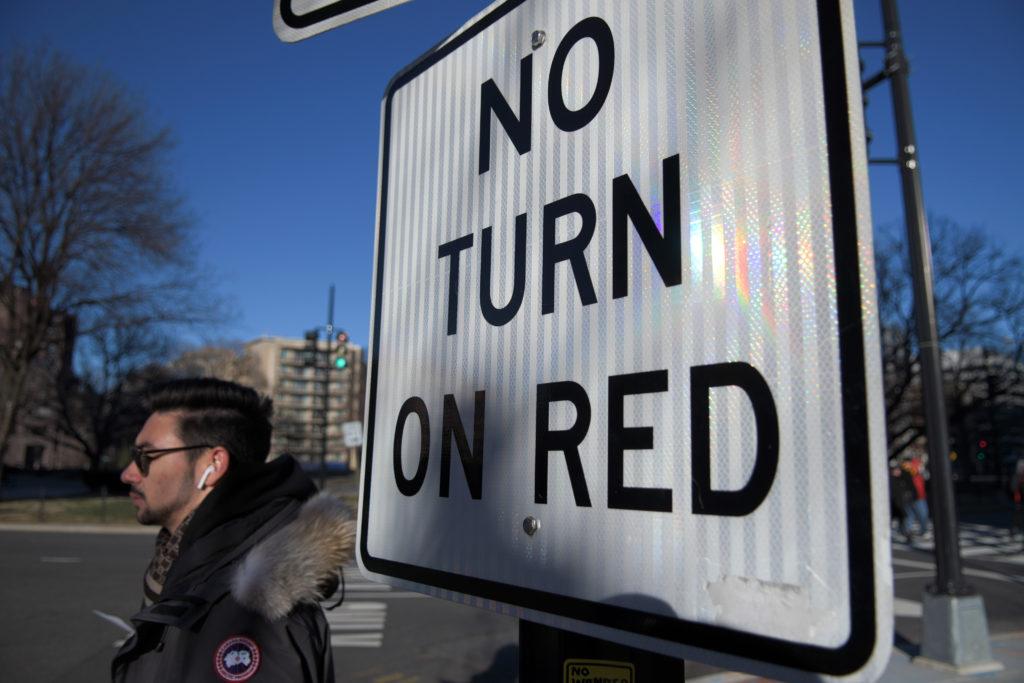Community leaders and Foggy Bottom residents said they support a citywide endeavor to prohibit right turns at some red lights, but many are concerned that both authorities and drivers will not put in the effort to enforce the ban.
The District Department of Transportation released a list of more than 100 intersections last month where it will ban right turns on red, including 11 locations in Foggy Bottom. The Foggy Bottom and West End Advisory Neighborhood Commission backed the proposal during a meeting last week and proposed additional intersections to tack onto the list.
But in interviews, more than 10 Foggy Bottom and West End residents and community leaders said that while they support the plan to prohibit some right turns at red lights, it is unclear whether the effort will reduce traffic violations and fatalities because drivers may ignore the signs, and the city may slack on enforcing the ban.
James Harnett, a junior and ANC commissioner, said at the ANC meeting last week that while he supports DDOT’s plans to make roads safer for pedestrians and bikers, he doesn’t think banning right turns at red lights is “going to do much” to alleviate traffic violations and fatalities “if it’s not paired with strong enforcement.”
“There are light-years of work that we still need to do in order to keep people safe, and we need to make sure that we’re not patting ourselves on the back for something that’s not going to do that much to keep people safe,” he said.
Harnett said ANC commissioners have reached out to DDOT and the Metropolitan Police Department in the past about traffic concerns, like a dangerous intersection at Washington Circle and 23rd Street NW, but MPD – the body in charge of enforcing traffic rules – is at “stretch capacity” and does not have enough resources to dedicate to enforcing the proposed ban.
“I’m not really optimistic that we’re going to see a huge uptick in our ability to enforce whatever rules we decide for the road if we don’t have other means making sure that drivers are doing what they’re supposed to do,” he said in an interview.
Matt O’Brien, a resident of Foggy Bottom, said the ban could help reduce fatalities in the District but could increase traffic at certain intersections if cars are not allowed to turn at some red lights.
He said he would prefer to have left turns banned at intersections throughout the city because by turning left, cars try to “intersect traffic,” which is more dangerous than turning at red lights.
“The right turns would help, and it’s probably a fairly easy fix, so that’s good, you can do it quickly,” O’Brien said. “I’d say it’s a step in the right direction, but it might take a few more steps.”
Sarah Shah, a Foggy Bottom resident, said city officials must make D.C. traffic rules “more clear” to drivers. She said drivers who come from out of state, including those who drive for ride-sharing companies like Uber, “don’t know the streets that well” and are often not sure where rights on red are not allowed.
“I’ve been in an Uber where it’s turned, and you’re not supposed to turn at a red light, and other times they just turn and they don’t even care,” Shah said. “It’s just not clear enough.”
Neil Fotre, a resident who lives on New Hampshire Avenue, said he the ban likely will not reduce traffic-related fatalities across the District because pedestrians often violate traffic laws by avoiding crosswalks.
“It just sounds like this is something to do something,” Fotre said. “The D.C. road system in and of itself is highly inconvenient and ineffective just the way the city is set up.”




